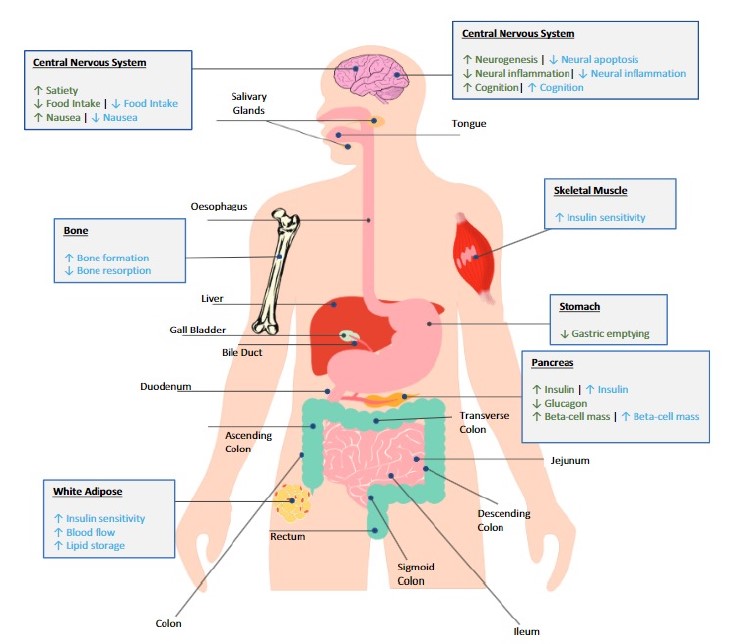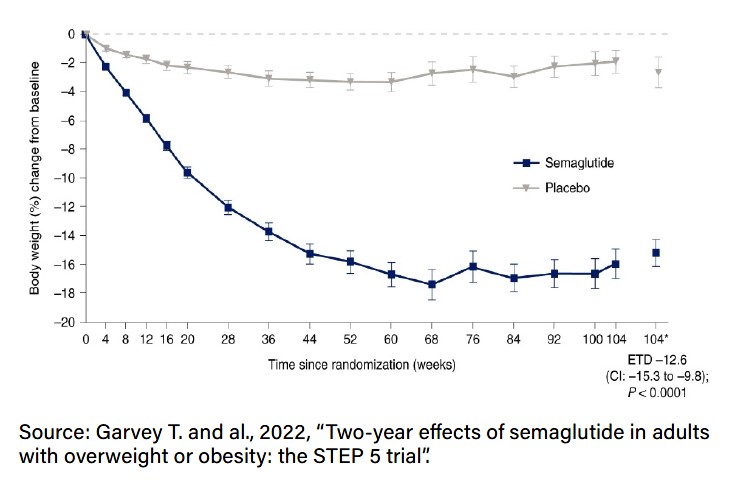GLP-1: a new therapeutic class of major interest?
Although GLP-1 drugs have existed for at least a decade, they did not truly hit the headlines until this year. Historically, they have been used mainly to treat type-2 diabetes. Only recently have they been shown to be effective in treating obesity.
Two drugmakers are now offering a new generation of these “GLP-1 drugs”, whose effects on weight loss have been spectacular. Lab-produced GLP-1 drugs remain active for a very long time (whereas GLP-1 produced by the body decomposes in a few minutes), which means that patients can be treated with a weekly injection.
The purpose of these injections is to “trick” the body into thinking that it has more GLP-1 than it actually does.
Published on 1 June 2024

How do GLP-1 drugs affect the body?
Taking GLP-1 drugs has numerous effects:
- Improved insulin secretion: GLP-1 drugs increase the secretion of glucose-dependent insulin. This is crucial in treating type-2 diabetes, as it helps control post-meal spikes in glycaemia but without triggering serious hypoglycaemia (i.e., a sudden drop in blood sugar).
- Suppression de la libération de glucagon: GLP-1 drugs prevent the secretion of glucagon, particularly after meals. The lower rate of glucagon reduces the production of glucose in the liver, which contributes to better control of glycaemia.
- Gastric clearance and satiety: GLP-1 slows the emptying of the stomach, thus extending post-meal satiety and reducing the pace at which glucose penetrates into the bloodstream. This triggers a sensation of being full sooner, and for longer, after a meal, which causes one to eat less and, ultimately, to lose weight.
- Central regulation of appetite: The central nervous system, the hypothalamus in particular, plays a crucial role in appetite regulation. GLP-1 drugs reach the brain and cause a reduction in appetite and, hence, in food intake. This impact on the central nervous system is a key factor in their effectiveness in managing weight.
- Cardiovascular and renal protection: Recent studies have found that GLP-1 drugs provide cardiovascular benefits, such as reducing the risk of a second major cardiovascular event. Recent clinical studies have also found renal protection effects.

Source : Lafferty R., P. Flatt & N. Irwin, 2023, “GLP-1/GIP analogs: potential impact in the landscape of obesity pharmacotherapy”.
How effective are GLP-1 drugs in weight loss?
The combined impacts of greater satiety, reduced gastric clearance and appetite suppression contribute significantly to reducing overall calorie intake.
The newly approved GLP-1 drugs have demonstrated that they cause average weight loss of 15% and as much as about 25% in some patients. The effects can obviously differ from one drug to another.
Example of the weight impact of a weekly dose of semaglutide

What are their side-effects of GLP-1?
The side-effects are generally not very serious but can be sufficiently troublesome to require phasing in the doses during the early stages of treatment. Their main side-effects are nausea and vomiting, and this can limit their attractiveness for certain patients.
The most serious side-effects, but which are rare, limit their use in persons having a history of pancreatis (inflammation of the pancreas) or thyroid cancer antecedents (due to the presence of GLP-1 receptors in the thyroid).
How long do the effects of GLP-1 drugs last?
While GLP-1 drugs have long-lasting effects on controlling glycaemia and, in some cases, on insulin secretion, the extent of these effects depends mainly on the patient’s adhering to the treatment regimen over time.
In the case of obesity, weight loss lasts as long as the patient continues to take the drug. Patients who stop doing so regain weight over time, although changes in lifestyle (diet and exercise) can help mitigate this.
More troubling is the fact that a significant portion of weight lost is from reduced muscle mass. If treatment is stopped, weight is regained more in the form of fat than muscle, as muscle mass has been lost.
Doctors warn against the serious long-term health problems caused by a regular loss of muscle mass in patients who have adopted a yoyo regime of weight loss and regain.
Conclusion
GLP-1 drugs are very promising in treating diabetes and obesity. However, weight loss lasts only as long as treatment, which raises the issue of lifetime acceptance of the treatment by patients who have not also adopted strategies for altering their lifestyles and diet.
As research progresses, GLP-1 drugs’ role in managing metabolic disorders is likely to expand, potentially offering a multi-faceted approach to tackling the global epidemic of obesity and diabetes.
Drug companies are currently working on oral agents having the same mechanism. This would widen their access and possibly lower their prices and open the door to tackling the problem of loss of muscle mass.